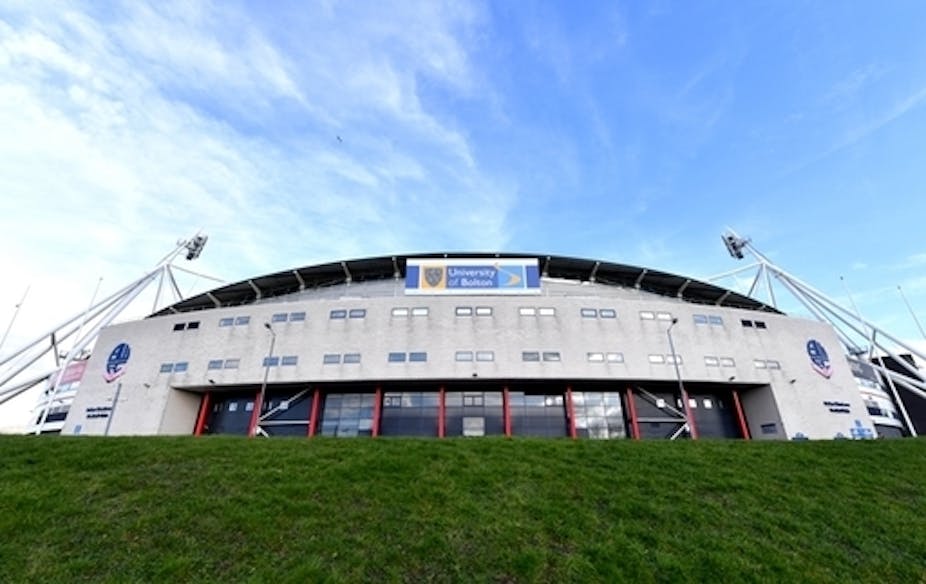Not every English football club is experiencing the memorable highs being celebrated by supporters of Tottenham Hotspur and Liverpool, as they look forward to battling over the Champions League trophy. Further down the rankings, it has not been a good season for Bolton Wanderers football club.
The team was relegated from the Championship, the second tier of English football, and is set to be placed into administration – a status that will be punished with a 12-point penalty at the beginning of the club’s time in League One (tier three).
The club’s financial status also led to the threat of strike action by Bolton Wanderers players last month, resulting in the unprecedented step of a league fixture being postponed. That strike was only called off after the players’ union, the Professional Footballers Association (PFA), loaned players part of their wages.
While the actual salary figures involved remain undisclosed, it is likely they are a tiny fraction of the huge wages earned by players at clubs like Manchester United and Chelsea. So going two months without pay has been a tough experience for all involved.
The beleaguered Lancashire club has also been in financial disarray for several years. Owner Ken Anderson has been trying to sell Wanderers since the start of the year, and the club appeared in the High Court on May 8 over a £1.2m unpaid tax bill.
Ahead of the planned strike action in April, players’ representative Andy Taylor said in a radio interview: “We’ve still got bills to pay, we’ve still got lives. As a group we just felt we had to make some sort of stance because we were going nowhere with things.”
It is a stance that had the full support of the PFA, which released a statement at the time praising the players’ “great patience and loyalty towards the club”, but agreeing they had “reached a point where action is necessary”.
It may be surprising, given the high profile of the PFA within English football, that this is the first time a league fixture has been postponed due to industrial action. Historically, the nearest comparison came in 1961.
Then, the association, led by the irrepressible Jimmy Hill, threatened strike action in support of abolishing the £20 per week maximum wage and the restrictive “retain and transfer” system which effectively made players chattels of their employers.
It was only when the football authorities agreed to abolish the maximum wage that the strike was averted – three days before it was about to begin. But it would take another two years of legal wrangling before the retain and transfer system was ruled to be an illegal restraint of trade.
Footballers have been more militant in support of their rights in other countries. Most recently, the start of the 2011-12 season in Italy’s Serie A was delayed by several weeks as players went on strike in support of a collective bargaining agreement with their clubs.
However, no footballing industrial dispute was as long-running, or had such far-reaching effects as the Argentine players’ strike of 1948-9. The strike took place in the context of increased worker militancy under president Juan Perón. Across the country, union membership had more than doubled from 877,333 in 1946 to 1,992,404 in 1950, and wages for industrial workers rose by 53% between 1946 and 1949.
A footballers’ union, the Fútbolistas Argentinos Agremiados, was formed in 1944, and in April 1948 it started flexing its muscles. It demanded recognition from the Argentine Football Association, the introduction of a minimum wage, abolition of the 1,500 peso (equivalent to £73) maximum monthly wage, and freedom of contract.
Striking a blow
The response of the clubs was instant rejection. They claimed accepting the demands would be economically ruinous and threaten the very existence of professional football in the country. A strike was called for April 1948, and although the concession of union recognition resulted in a short delay, when the other demands remained unmet, the strike started in July.
The most famous of the strike leaders was the River Plate forward, Alfredo Di Stéfano, who would later attain global reknown playing in Spain for Real Madrid. During a loan period with another side, Di Stéfano had seen teammates go unpaid for months at a time, a recurring experience at smaller clubs.
The championship was played out with junior players replacing the strikers, but crowds fell alarmingly, dissatisfied with the spectacle on offer. Racing Club, which refused to play with juniors, was worst affected. Having led the table before the dispute, it forfeited several fixtures, handing the title to their arch rivals.

A resolution was eventually concluded in May 1949 to enable the next season to start belatedly, as concessions were made over contract lengths, although crucially not over the maximum wage. As a result, a rebel league in Colombia stepped in to the breach, offering Di Stéfano and 104 of Argentina’s best players the opportunity to vastly improve their wages, setting back the development of Argentine football for nearly a decade.
For the sake of their long-suffering fans, players and staff, hopefully Bolton Wanderers will soon be restored to administrative normality. In the meantime, its players have left their own footnote in football history, albeit one not associated with the usual prize of glory on the pitch.

